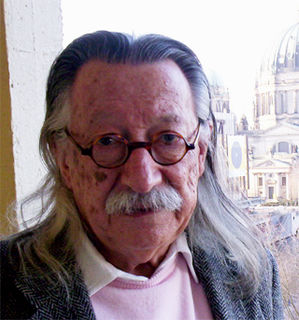A Quote by Joseph Weizenbaum
Man is not a machine, ... although man most certainly processes information, he does not necessarily process it in the way computers do. Computers and men are not species of the same genus. .... No other organism, and certainly no computer, can be made to confront genuine human problems in human terms. ... However much intelligence computers may attain, now or in the future, theirs must always be an intelligence alien to genuine human problems and concerns.
Related Quotes
With genetic engineering, we will be able to increase the complexity of our DNA, and improve the human race. But it will be a slow process, because one will have to wait about 18 years to see the effect of changes to the genetic code. By contrast, computers double their speed and memories every 18 months. There is a real danger that computers will develop intelligence and take over. We urgently need to develop direct connections to the brain so that computers can add to human intelligence rather than be in opposition.
Every computer divides itself into its hardware and its software, the machine host to its algorithm, the human being to his mind. It is hardly surprising that men and women have done what computers now do long before computers could do anything at all. The dissociation between mind and matter in men and machines is very striking; it suggests that almost any stable and reliable organization of material objects can execute an algorithm and so come to command some form of intelligence.
Right up till the 1980s, SF envisioned giant mainframe computers that ran everything remotely, that ingested huge amounts of information and regurgitated it in startling ways, and that behaved (or were programmed to behave) very much like human beings... Now we have 14-year-olds with more computing power on their desktops than existed in the entire world in 1960. But computers in fiction are still behaving in much the same way as they did in the Sixties. That's because in fiction [artificial intelligence] has to follow the laws of dramatic logic, just like human characters.
Everything is being run by computers. Everything is reliant on these computers working. We have become very reliant on Internet, on basic things like electricity, obviously, on computers working. And this really is something which creates completely new problems for us. We must have some way of continuing to work even if computers fail.
Chess is a unique battlefield for human minds and computers - human intuition, our creativity, fantasy, our logic, versus the brute force of calculation and a very small portion of accumulated knowledge infused by other human beings. So in chess we can compare these two incompatible things and probably make projections into our future. Is there danger that the human mind will be overshadowed by the power of computers, or we can still survive?
I feel many problems that we are facing, are man-made problems, we have too much emphasis on this secondary thing, forgetting our foundation. At foundation, we are the same human being and we are sharing the same planet. Six billion human beings' future is my future and my future is never separate from the future of six billion human beings.
Everybody remembers numbers and computers remember numbers. People remember procedures and computers certainly remember procedures. But the other thing that's still important is that your perception as a human is affected subtly by all this stuff that you can't quite articulate. You run your life according to all this stuff that's happened to you. All of your memories affect everything you do whereas with a computer, there's adaptive software and things, but it's more literal.
With both people and computers on the job, computer error can be more quickly tracked down and corrected by people and, conversely, human error can be more quickly corrected by computers. What it amounts to is that nothing serious can happen unless human error and computer error take place simultaneously. And that hardly ever happens.































